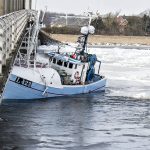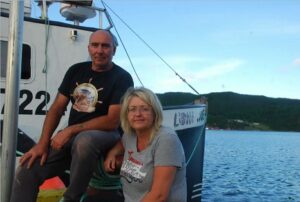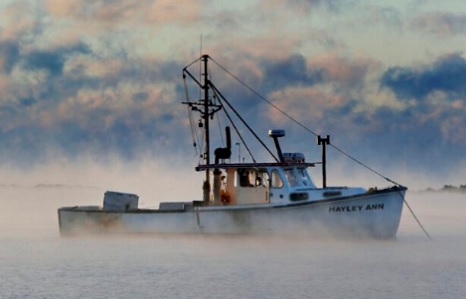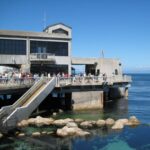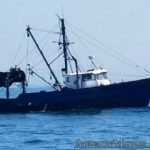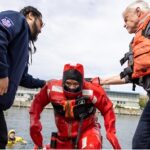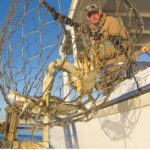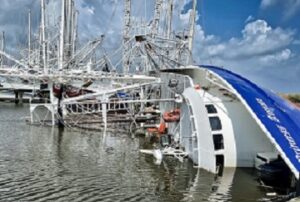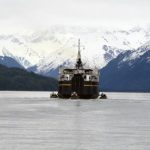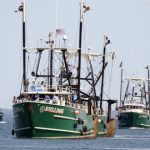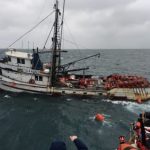Daily Archives: January 30, 2017
Controversial flounder plan could get final approval Thursday
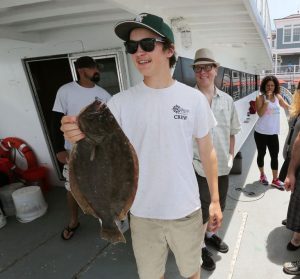 A proposal to drastically reduce this year’s summer flounder catch could get final approval at a federal regulatory meeting Thursday morning in Virginia. The Atlantic States Marine Fisheries Committee is scheduled consider strategies that would reduce the summer flounder harvest by up to 41 percent coast-wide and implement tighter restrictions on bag and size limits for recreational fishermen. It’s a proposal that has been met with widespread criticism in New Jersey—from recreational fishermen, both U.S. Senators, multiple other politicians and even the head of the state Department of Environmental Protection. In August, the ASMFC and the Mid-Atlantic Fishery Management Council set the summer flounder harvest limit at an all-time low in response to the most recent stock assessment, and, last month, the regulatory bodies approved a set of options to meet that goal. Read the rest of the story here 21:27
A proposal to drastically reduce this year’s summer flounder catch could get final approval at a federal regulatory meeting Thursday morning in Virginia. The Atlantic States Marine Fisheries Committee is scheduled consider strategies that would reduce the summer flounder harvest by up to 41 percent coast-wide and implement tighter restrictions on bag and size limits for recreational fishermen. It’s a proposal that has been met with widespread criticism in New Jersey—from recreational fishermen, both U.S. Senators, multiple other politicians and even the head of the state Department of Environmental Protection. In August, the ASMFC and the Mid-Atlantic Fishery Management Council set the summer flounder harvest limit at an all-time low in response to the most recent stock assessment, and, last month, the regulatory bodies approved a set of options to meet that goal. Read the rest of the story here 21:27
Southeast Alaska winter troll season slow
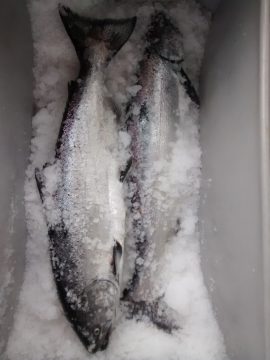 Commercial troll fishing for king salmon in Southeast Alaska this winter is not like it has been the last few years. The troll fleet catch and the number of boats out fishing are both well down from last year and also below the five and ten-year averages. By late January, the catch had neared 8,000 Chinook, with more than half of those kings landed in the waters around Sitka Sound. Eight thousand is just one quarter of what the catch was at this time last year.“I would say that the past three years have been phenomenal for the troll fishery so seeing a decrease now doesn’t necessarily mean that the fishery’s terrible, it just means that we’re going back to lower averages,” said Rhea Ehresmann is assistant troll management biologist with the Alaska Department of Fish and Game. Read the story here 19:07
Commercial troll fishing for king salmon in Southeast Alaska this winter is not like it has been the last few years. The troll fleet catch and the number of boats out fishing are both well down from last year and also below the five and ten-year averages. By late January, the catch had neared 8,000 Chinook, with more than half of those kings landed in the waters around Sitka Sound. Eight thousand is just one quarter of what the catch was at this time last year.“I would say that the past three years have been phenomenal for the troll fishery so seeing a decrease now doesn’t necessarily mean that the fishery’s terrible, it just means that we’re going back to lower averages,” said Rhea Ehresmann is assistant troll management biologist with the Alaska Department of Fish and Game. Read the story here 19:07
Price spikes for jumbo shrimp blamed on Gulf of Mexico dead zone
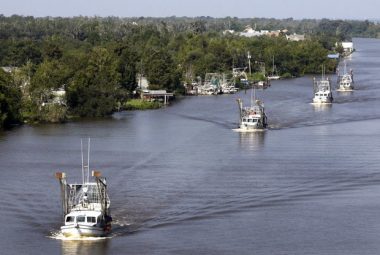 Every spring and summer when the low-oxygen dead zone forms off Louisiana’s coastline, the price of jumbo shrimp briefly spikes, affecting Gulf of Mexico fishers, consumers and seafood markets, according to a new study published Monday (Jan. 30) in the Proceedings of the National Academy of Sciences. And the price for smaller shrimp generally falls. The positive effect of the price increase on jumbo shrimp for Gulf commercial shrimpers are fleeting, however. That’s because the rise often triggers increased imports of large shrimp from foreign producers, including farm-raised shrimp, which quickly drive down prices. The dead zone is an area of low oxygen — with levels of oxygen at or below 2 parts per million — that scientists define as hypoxia. Freshwater rich in nitrogen and phosphorus from Midwest farms and from nutrient-rich sewage from cities and rural areas enters the Gulf each spring and summer, forming a freshwater layer over the Gulf’s saltier sea water. Read the full story here 18:41
Every spring and summer when the low-oxygen dead zone forms off Louisiana’s coastline, the price of jumbo shrimp briefly spikes, affecting Gulf of Mexico fishers, consumers and seafood markets, according to a new study published Monday (Jan. 30) in the Proceedings of the National Academy of Sciences. And the price for smaller shrimp generally falls. The positive effect of the price increase on jumbo shrimp for Gulf commercial shrimpers are fleeting, however. That’s because the rise often triggers increased imports of large shrimp from foreign producers, including farm-raised shrimp, which quickly drive down prices. The dead zone is an area of low oxygen — with levels of oxygen at or below 2 parts per million — that scientists define as hypoxia. Freshwater rich in nitrogen and phosphorus from Midwest farms and from nutrient-rich sewage from cities and rural areas enters the Gulf each spring and summer, forming a freshwater layer over the Gulf’s saltier sea water. Read the full story here 18:41
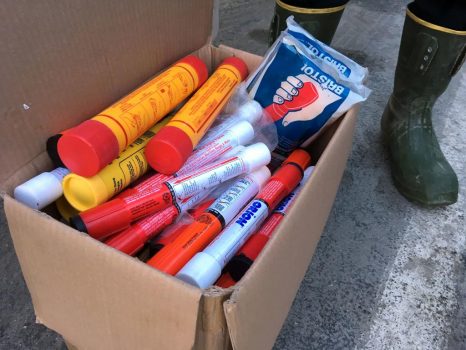
A Maine lobsterman brings up a serious issue. What to do with expired marine distress flares
After a lobsterman called her attention to unsafe and environmentally hazardous practices, a state representative is proposing a formal system for disposal of expired marine distress flares. It began with a simple question this past summer from Bob Perry, a Bailey Island lobsterman who was telling his sister over coffee one morning that he was not sure where he could dispose of old flares. The flares, which expire after 42 months, employ pyrotechnic chemicals and are classified as hazardous waste that cannot be buried in a landfill. “I was telling her, ‘I’ve got these flares, and I’ve got no idea what to do with them,’” Perry said last week. With the exception of smaller boats and specific recreational uses, existing law mandates that large vessels must be equipped with visual distress signals, most of which use pyrotechnic chemicals to emit a bright emergency flare, according to the Boater’s Guide to Maine Laws and Responsibilities. “I can’t be the only one on the coast of Maine that doesn’t know how to get rid of them,” he said. Read the story here 17:10
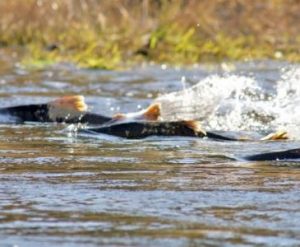
Feds Facing Order to Redirect Klamath River Water for Salmon
Two Native American tribes sued the U.S. Bureau of Reclamation last year, claiming its bungled management of Klamath River waterways allowed a deadly parasite to infect 91 percent of endangered juvenile Coho and Chinook salmon. The Yurok and Hoopa Valley Tribes say they depend on the salmon for subsistence, income and for traditional ceremonies that define their people. Lawyers for the federal government and an industry group of farmers and ranchers argue that diverting water to help salmon will harm businesses that support local jobs and communities and threaten another set of endangered fish, the shortnose sucker and Lost River sucker. In separate complaints against the federal government, the tribes say infection rates caused by the deadly parasite C. shasta, should have required the bureau to review its Klamath Irrigation Project’s impact on threatened salmon two years ago, but the bureau failed to take action in violation of the Endangered Species Act.During a hearing Friday, U.S. District Judge William Orrick III agreed the bureau should have reviewed the project when infection rates climbed to 81 percent in 2014 and 91 percent in 2015, well beyond the maximum 49 percent estimated in a 2013 biological opinion issued by co-defendant National Marine Fisheries Service. Read the story here 16:47
Five fishermen rescued from trawler before it sank off Irish coast
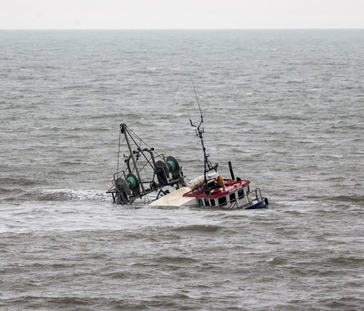 Five crew members had to be rescued from a trawler after it ran aground off Balbriggan in north Dublin early this morning. The 12 metre vessel became disabled at sea and was blown ashore, becoming lodged on a sandbank. The alarm was raised at 5.20am and Dublin coastguard coordinated the rescue. One inshore lifeboat and two all-weather lifeboats were sent to the scene. The Rescue 116 Coast guard helicopter was also involved in the operation. This morning the boat, called the Atlantic Osprey, could be seen half submerged in the sea south of Balbriggan. The wooden hull vessel had been fishing for razor clams when the incident occurred. Read the rest of the story here 16:02
Five crew members had to be rescued from a trawler after it ran aground off Balbriggan in north Dublin early this morning. The 12 metre vessel became disabled at sea and was blown ashore, becoming lodged on a sandbank. The alarm was raised at 5.20am and Dublin coastguard coordinated the rescue. One inshore lifeboat and two all-weather lifeboats were sent to the scene. The Rescue 116 Coast guard helicopter was also involved in the operation. This morning the boat, called the Atlantic Osprey, could be seen half submerged in the sea south of Balbriggan. The wooden hull vessel had been fishing for razor clams when the incident occurred. Read the rest of the story here 16:02
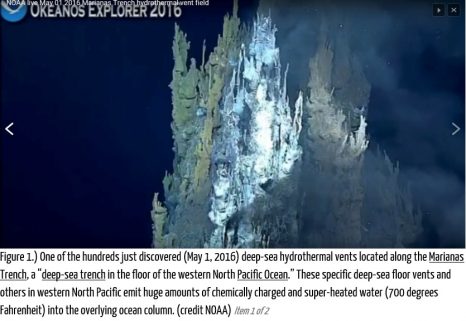
Further proof El Niños are fueled by deep-sea geological heat flow
The 2014-2017 El Niño “warm blob” was likely created, maintained, and partially recharged on two separate occasions by massive pulses of super-heated and chemically charged seawater from deep-sea geological features in the western North Pacific Ocean. This strongly supports the theory all El Niños are naturally occurring and geological in origin. Climate change / global warming had nothing to do with generating, rewarming, intensifying, or increasing the frequency of the 2014-2017 El Niño or any previous El Niño. If proven correct, this would revolutionize climatology and key aspects of many interrelated sciences such as oceanography, marine biology, glaciology, biogeochemistry, and most importantly meteorology. Information supporting a geological origin of El Niños is diverse, reliable, and can be placed into five general categories as follows,,, Read the article here 13:19
The idea that “the public” will use Global Fishing Watch seems doubtful
 At John Kerry’s 2014 “Our Ocean” conference, a tuxedoed Leonardo DiCaprio introduced a new technology that promised to end illegal fishing across the globe. Global Fishing Watch boasted real-time monitoring of the world’s ships. This machine-learning spy tool was the result of a collaboration between the conservation advocacy organization Oceana, the satellite surveillance firm SkyTruth, and Google. After it collects and maps vessel location data transmitted from onboard satellite tracking devices, the program organizes all data points on a user-friendly Internet platform. For the first time in history, all fishing activity is recorded–even on the high seas that lie outside national jurisdictions. With Global Fishing Watch’s all-seeing gaze, states can adjudicate crimes to which they were previously blind. But the idea that “the public” will use Global Fishing Watch seems doubtful. The web platform lacks common features without which vigilantes would need a lot of training: pop-ups of helpful tips on what to watch for, alerts to specific hot-spots, built-in reporting mechanisms, or forums for users to share their experiences. Worse, those who the technology could most benefit–local fishers forced to compete with larger illegal ships–often do not have access to a decent Internet connection. If Global Fishing Watch is unlikely to be used by ordinary citizens of the countries most affected by illegal fishing, why is it marketed like a neighborhood watch tool? Read the story here 11:27
At John Kerry’s 2014 “Our Ocean” conference, a tuxedoed Leonardo DiCaprio introduced a new technology that promised to end illegal fishing across the globe. Global Fishing Watch boasted real-time monitoring of the world’s ships. This machine-learning spy tool was the result of a collaboration between the conservation advocacy organization Oceana, the satellite surveillance firm SkyTruth, and Google. After it collects and maps vessel location data transmitted from onboard satellite tracking devices, the program organizes all data points on a user-friendly Internet platform. For the first time in history, all fishing activity is recorded–even on the high seas that lie outside national jurisdictions. With Global Fishing Watch’s all-seeing gaze, states can adjudicate crimes to which they were previously blind. But the idea that “the public” will use Global Fishing Watch seems doubtful. The web platform lacks common features without which vigilantes would need a lot of training: pop-ups of helpful tips on what to watch for, alerts to specific hot-spots, built-in reporting mechanisms, or forums for users to share their experiences. Worse, those who the technology could most benefit–local fishers forced to compete with larger illegal ships–often do not have access to a decent Internet connection. If Global Fishing Watch is unlikely to be used by ordinary citizens of the countries most affected by illegal fishing, why is it marketed like a neighborhood watch tool? Read the story here 11:27
In 1895 a historian urged us to modernize our fish products and speed them to market
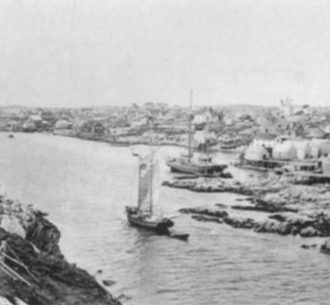 Lawyer, judge, historian and essayist — and son of Port de Grave — Daniel Prowse must surely have been smacking his lips when he wrote about our seafood in a concluding portion of his 1895 history. It was all about freshness and the abundance we had here and how we could access better markets. The railway, speeding from the east coast of our island to the west coast to meet a fast boat on the southwest corner would make it possible for us to earn big, new money from seafood hungry New Yorkers. Rapturously Prowse wrote: “Frozen cod and most delicious cod’s tongues, fresh every morning, will be transported from our shores!” I will admit that it stretches credulity to pair any judge with the adverb “rapturously,” however, I think it’s fair to say Prowse loved Newfoundland. And he always wanted us to do more and better with what we had. Good read! Read the story here 09:53
Lawyer, judge, historian and essayist — and son of Port de Grave — Daniel Prowse must surely have been smacking his lips when he wrote about our seafood in a concluding portion of his 1895 history. It was all about freshness and the abundance we had here and how we could access better markets. The railway, speeding from the east coast of our island to the west coast to meet a fast boat on the southwest corner would make it possible for us to earn big, new money from seafood hungry New Yorkers. Rapturously Prowse wrote: “Frozen cod and most delicious cod’s tongues, fresh every morning, will be transported from our shores!” I will admit that it stretches credulity to pair any judge with the adverb “rapturously,” however, I think it’s fair to say Prowse loved Newfoundland. And he always wanted us to do more and better with what we had. Good read! Read the story here 09:53
American Samoa Governor Lolo Moliga – US Sanctuary Program cannot dictate how territorial government uses local waters
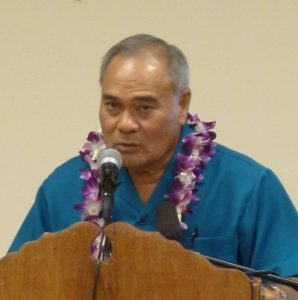 The governor said he met with officials of the National Marine Sanctuary Foundation and explained to them the position of the legislature and the executive branch concerning federal oversight of areas included in the Sanctuary of American samoa. He said it’s not that American Samoa is against conservation, rather it’s the way that the federal government has taken over jurisdiction of local waters included in the sanctuary that he has a problem with. Waters included in the marine Sanctuary of American Samoa are not open for commercial fishing, and there are also restrictions on take for subsistence fishing. Speaking at a cabinet meeting the governor also said that the Attorney General will fight American Samoa’s lawsuit against the US government to take back control of local waters. link 09:20
The governor said he met with officials of the National Marine Sanctuary Foundation and explained to them the position of the legislature and the executive branch concerning federal oversight of areas included in the Sanctuary of American samoa. He said it’s not that American Samoa is against conservation, rather it’s the way that the federal government has taken over jurisdiction of local waters included in the sanctuary that he has a problem with. Waters included in the marine Sanctuary of American Samoa are not open for commercial fishing, and there are also restrictions on take for subsistence fishing. Speaking at a cabinet meeting the governor also said that the Attorney General will fight American Samoa’s lawsuit against the US government to take back control of local waters. link 09:20
Oregon did the right thing in backing off gillnet ban on the main Columbia River. Washington state should too.
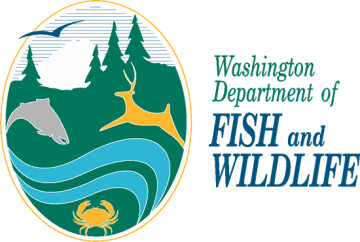 The Oregon Fish and Wildlife Commission is to be commended for recognizing that a 2013 policy dictated by former Gov. John Kitzhaber to kick commercial salmon fishing off the Columbia River has failed. It isn’t just Lower Columbia River residents who think so. Bobby Levy, former commission chair, commented on Facebook, “Oregon Fish and Wildlife commissioners did the fair and right thing! I applaud you!!” Levy led the commission in 2012 and 2013 when the two fish and wildlife commissions of Oregon and Washington state headed down the path to implementing the Kitzhaber scheme. Never fully thought out, gutting a centurylong tradition of supplying local consumers with some of the salmon we support with our taxes and electric rates was largely the product of intense lobbying by one subset of recreational fishing, embodied by the Northwest Sportsfishing Industry Association. A long-successful alliance between different salmon-fishing interests was cast aside, resulting in a loss of important unified advocacy for salmon recovery in the Columbia estuary and basin. Evicting gillnetters from the main stem of the Columbia by the end of 2016 was premised on a number of assumptions, including: Read the rest of the op-ed here 08:29
The Oregon Fish and Wildlife Commission is to be commended for recognizing that a 2013 policy dictated by former Gov. John Kitzhaber to kick commercial salmon fishing off the Columbia River has failed. It isn’t just Lower Columbia River residents who think so. Bobby Levy, former commission chair, commented on Facebook, “Oregon Fish and Wildlife commissioners did the fair and right thing! I applaud you!!” Levy led the commission in 2012 and 2013 when the two fish and wildlife commissions of Oregon and Washington state headed down the path to implementing the Kitzhaber scheme. Never fully thought out, gutting a centurylong tradition of supplying local consumers with some of the salmon we support with our taxes and electric rates was largely the product of intense lobbying by one subset of recreational fishing, embodied by the Northwest Sportsfishing Industry Association. A long-successful alliance between different salmon-fishing interests was cast aside, resulting in a loss of important unified advocacy for salmon recovery in the Columbia estuary and basin. Evicting gillnetters from the main stem of the Columbia by the end of 2016 was premised on a number of assumptions, including: Read the rest of the op-ed here 08:29
Labour Relations Board Hearing Tuesday into release of FFAW membership list
 The Federation of Independent Sea Harvesters of Newfoundland and Labrador (FISH-NL) welcomes a hearing called by the Labour Relations Board over the FFAW’s failure to release its membership list of inshore fish harvesters. “The lengths the FFAW has taken to inflate and withhold its membership list is yet another act of crookery,” says Ryan Cleary, President of FISH-NL. “We look forward to being able to dig into their list.”The hearing is scheduled to take place from 9:30 to 12:30 on Tuesday, Jan. 31st at the Labour Relations Board Hearings Room, 1st floor, Beothuk Building, 20 Crosbie Place in St. John’s. Read the full press release here 07:49
The Federation of Independent Sea Harvesters of Newfoundland and Labrador (FISH-NL) welcomes a hearing called by the Labour Relations Board over the FFAW’s failure to release its membership list of inshore fish harvesters. “The lengths the FFAW has taken to inflate and withhold its membership list is yet another act of crookery,” says Ryan Cleary, President of FISH-NL. “We look forward to being able to dig into their list.”The hearing is scheduled to take place from 9:30 to 12:30 on Tuesday, Jan. 31st at the Labour Relations Board Hearings Room, 1st floor, Beothuk Building, 20 Crosbie Place in St. John’s. Read the full press release here 07:49

































